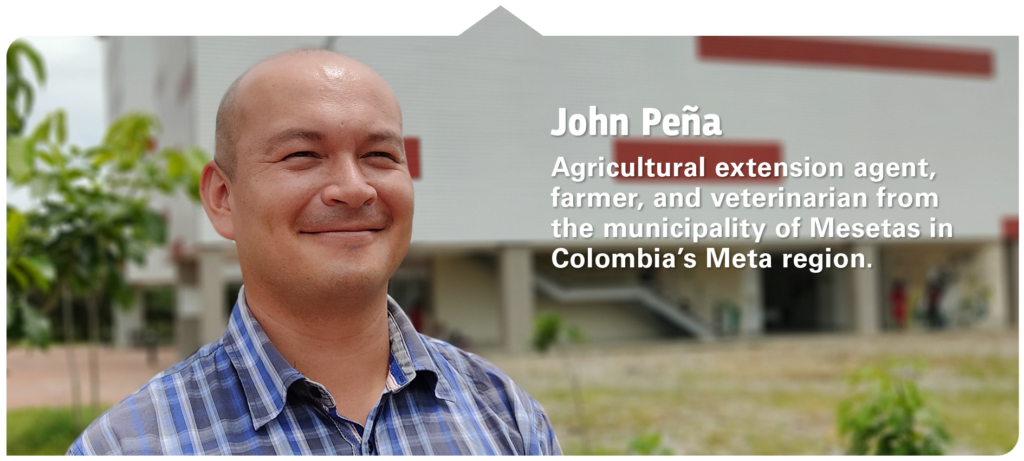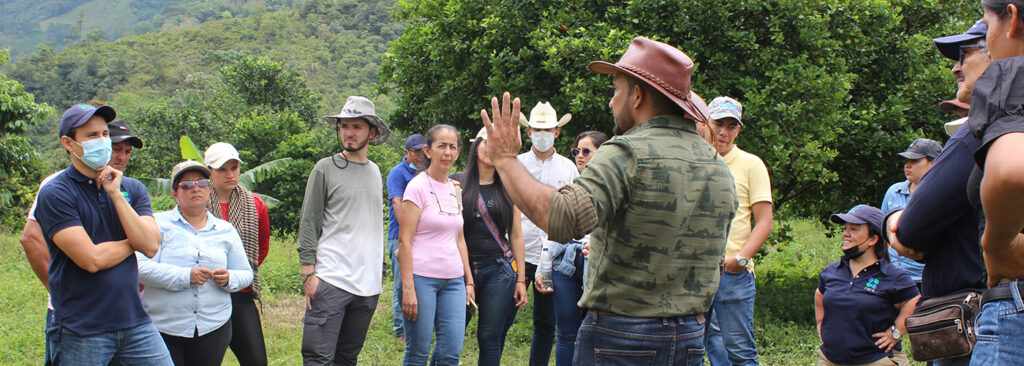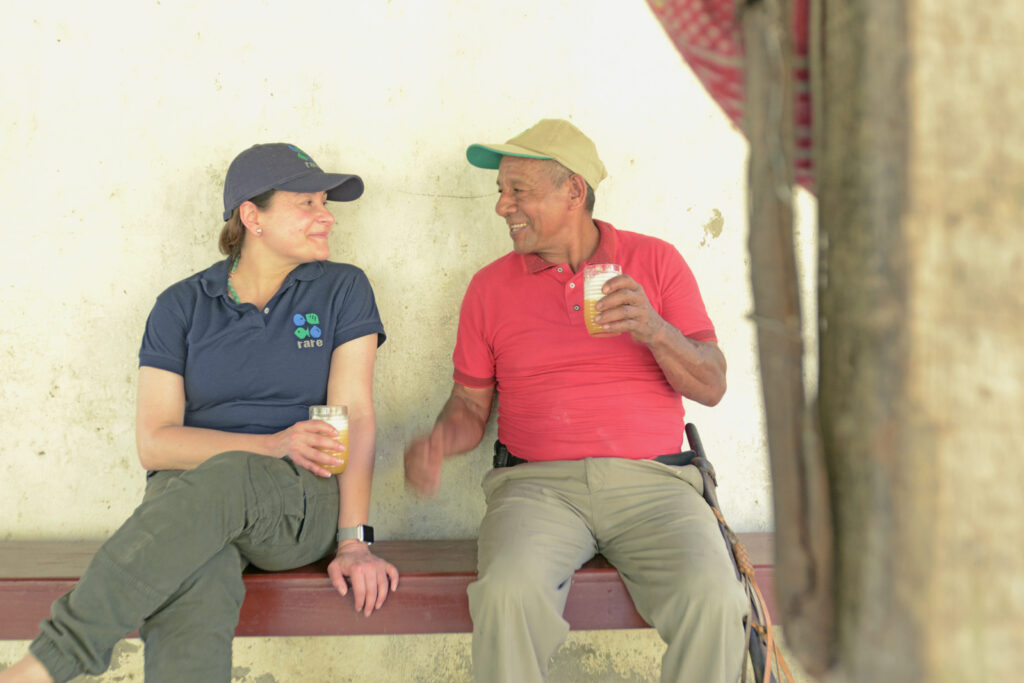For Colombian agricultural expert John Peña, May 13, 2022, marked an extraordinary occasion during an otherwise ordinary spring growing season: Graduation Day. Alongside 53 graduates with ‘certificados’ in hand, John joined the nearly 100 extension agents trained by Rare and Universidad de los Llanos to change social norms around farming in Colombia as part of an initiative supported by the UK PACT program and the Colombian Ministry of Agriculture and Rural Development.
The training taught us to become not only facilitators but leaders, and gave us more tools to help farmers change their behaviors.”

From March to May, in an intensive classroom-to-field program, John and fellow agents delved into a myriad of topics beyond the traditional agricultural extension service curriculum: behavioral science and behavior-centered design for agriculture, governance, facilitation, and leadership skills, climate-smart farming practices, social marketing, and technology for innovation. This second annual program offered agents a new way to support rural farming communities in the fertile Meta region.
“The approach is unlike any other—super interesting and efficient,” said Libia, an agricultural expert working in the Guamal municipality’s entrepreneurship, competitiveness, and innovation division. “Instilling capacity in the producers helps them make their own decisions and replicate what works in their communities. And the method of getting the whole community to understand the process of behavior change is an invitation for us all to get involved in creating our story of change.”
Around the world, extension agents have been hailed as unsung heroes of the agricultural world. Despite their significant impacts on farming communities, their essential work—serving as agricultural experts in rural areas—often goes unrecognized and uncelebrated. They not only improve farmers’ livelihoods and agricultural productivity but promote their abilities to direct their future development.
Juan Gonzalo Botero, Colombia’s Vice Minister of Agriculture, expressed his appreciation during the graduation ceremony,
I would like to recognize the work of the extensionists and congratulate the participating producers for their results,” he said. “This work is very promising and offers important results for the sector’s future in Colombia.”
In Colombia, agricultural experts are commonly referred to as agents, advisors, friends, or partners—an informality that belies their everyday importance and relevance to the rural sector. They come from municipal government offices, national environmental and agricultural government authorities, private institutions, and community-based organizations or work independently.
“There is so much wisdom in the agricultural sector that we cannot lose,” shared Neymar Murillo, an agent of multiple municipalities in the Meta region. “Especially this idea of nourishing the soil with compost instead of fertilizer. This training motivated me to be a better partner in building trust with farmers and supporting them to make more sustainable choices in their daily lives.”

But in Colombia, like many rural areas worldwide, farmers and their extension services face barriers to productivity and more regenerative and climate-friendly farming. Farmers need support to change how they farm, but less than 16% of farmers in Colombia receive extension assistance. And Colombian farmers face challenging economic circumstances. Within Meta’s rural areas, 44% of the population are poor, with 18% classified as very poor—higher than the national average.
On the other hand, extension agents also need support to promote the right bundle of practices to smallholder farmers: ones that optimize productivity and are climate compatible. The agents require training to learn how to promote these practices in ways that lead to actual and sustained behavior change.
Monica Varela, Vice President of Rare’s Lands for Life program in Colombia, explains how Rare is working to address sustained change for Colombia’s smallholder farmers. “Rare’s regenerative agriculture program strengthens extension agents’ skills to train farmers to adopt more regenerative and sustainable land-use practices. While agriculture plays a major role in the climate crisis, farmers and agents are uniquely situated to be part of the solution.”

Nearly a quarter of the world’s greenhouse gas emissions come from land use and agriculture combined. Lands for Life focuses its work in Meta, the second-largest contributor of GHG emissions among Colombia’s 32 departments. The program tackles behavioral challenges and empowers farmers to shift to regenerative agriculture and more sustainable ranching to protect Colombia’s soil, water, and biodiversity. “For each extension agent trained, we reach 60 more farmers with our behavioral approach,” Monica adds.
Rare’s research has shown that farmers make decisions based on two social variables: social proof and social pressure. Past efforts to help farmers adopt positive behavioral changes have failed because the programs didn’t incorporate these variables. “Behavioral science tells us that combining social proof (where farmers observe their peers adopting the targeted practices) and social pressure (where farmers perceive a behavior as one expected in their community) will help change social norms,” adds Giancarlo Chiappe, Rare’s behavioral science lead in Colombia. ”In turn, this combination will help to change behaviors.”
By training more extension agents, associations, and local authorities, Lands for Life is building local capacity and in-country knowledge, offering lasting development benefits for other regions beyond Meta. This knowledge transfer can transform territories at a landscape level, increasing productivity and incomes while mitigating and aiding adaptation to climate change.
Agent John Peña offers parting advice for future extension agents: “For anyone thinking about taking this training and learning new ways to farm for the future, I would say, ‘Conquer your fear of change and leave your comfort zone.’ My comfort zone was farming with chemical fertilizers. But with a little more effort, we will produce a more sustainable and beautiful landscape and leave better soil for our future generations.”